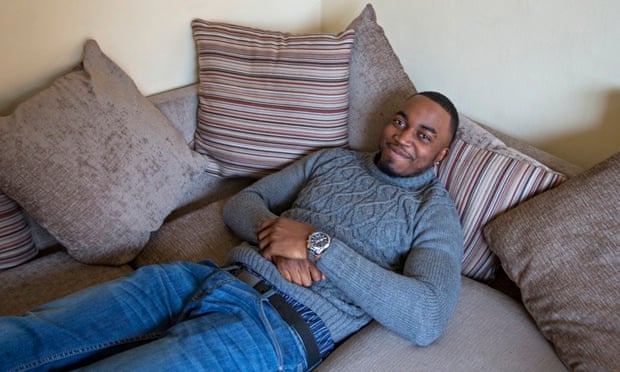The mortgage that allows students to buy their own homes
01-12-2015

Some building societies are willing to lend undergraduates 100% of the cost, up to £300,000, to buy a home – with certain guarantees
Jonathan Pearson
Jonathan Pearson will graduate with a profit, not a student debt. Photograph: Graham Turner
Patrick Collinson
He’s in his third year at university, studying hard ahead of his final exams this year – but, unlike other students, Jonathan Pearson will graduate with a profit, not a student debt. He is not from a wealthy background but stands to make at least £30,000 after buying a home, rather than renting while at college.
Most other homebuyers struggle for years to find the necessary deposit, with Halifax reporting this week that the average age of a first-timer has now topped 30. But Pearson did not even have to put down a deposit, managing to obtain a 100% loan from a reputable building society.
At the age of 20 he was granted a £183,000 mortgage by Bath building society to buy a three-bed home in Chelmsford, Essex, where he has been studying architecture and technology at Anglia Ruskin University. He turned the lounge into a bedroom for his own use, and rented the three bedrooms to other students at his college.
Advertisement
The cost to Pearson of servicing the mortgage has been just £775 a month, far less than the £1,320 he manages to collect in rent. To be on the safe side, he budgets for costs of £1,100 a month to cover utilities and insurance, but has still enjoyed a month-on-month profit of around £200 – while living rent-free.
Even if there had been no rise in property prices, Pearson would have been in profit. But over the past two years, prices in Chelmsford, a commuter town a 40-minute train ride from London, have risen significantly. “It’s worth about £220,000 now – if not a bit more,” he says, which suggests a paper profit of around £37,000.
What’s more, Pearson can avoid tax because his loan is not a traditional buy-to-let mortgage, where a landlord is liable for tax on the income and on any capital gain. The mortgage was taken out in his name, and because he lives in the property as his principal residence, he qualifies for full relief from capital gains tax.
So how does a 20-year-old with no obvious means bag a 100%, £183,000 mortgage, to be repaid on an interest-only basis, when almost every other young buyer has to put down a deposit and make repayments that would cost around £1,075 a month rather than £775 once capital repayment is added on top of the interest?
Pearson does not pretend to be a financial whizz-kid. “To be honest, my mother had been dealing with a financial adviser, who told her about this scheme when he knew I was going through university. They met up, talked it through and basically what was needed was that my mother had at least £40,000 in equity in her home to be able to act as a guarantor, and that I had to complete a full year at university. They helped me find the property as well, and we managed to get £7,000 lopped off the asking price of £190,000.”
But what about the other fees and costs for taking out a mortgage and buying a home – such as conveyancing costs? Pearson says these added up to just under £5,000, and that his mother helped him out again. So while you don’t necessarily have to come from a very well-off background, this loan won’t work if your parents are renting, if their own mortgage is very large or if they can’t help out on fees.
The risks are also numerous. Property prices go down as well as up. The students may not pay the rent on time. The student owner may want to drop out of university. The parents will find remortgaging or arranging other finance much more onerous while they are guaranteeing another loan. The property itself may have other costs – such as boiler breakdowns or other mishaps.
At Bath building society, mortgages of this type make up nearly a 10th of their total business, and are particularly popular at this time of year. This is when first-year students begin eyeing up where they are going to live in their second year, starting in September or October – which is where the society’s “Buy for Uni” product comes to the fore.
Jonathan bought a house in Chelmsford, while studying at Anglia Ruskin University.
Pearson bought a house in Chelmsford, while studying at Anglia Ruskin University. Photograph: Graham Turner
Dick Jenkins, chief executive of the society, says: “We have been doing this for seven years now, and it has worked exceptionally well. We have even had an 18-year-old take one out. It has an extremely low arrears rate, and we tend to find that the students who take out this mortgage are very picky about their flatmates – they don’t want people who will trash the place. They tend to be very responsible. But it’s certainly not for everyone. It works better for those doing longer courses such as medicine and architecture, and we have had quite a few vets. I understand the concern that it will appeal to better-off families, but that doesn’t invalidate it as a mortgage product.”
There are also numerous conditions that potential buyers have to meet. It’s only available in England and Wales; the property has to be within 10 miles of the university; and the student must have two or more years left on their course. They can borrow up to 100% of the value of the property, up to a maximum of £300,000, which effectively removes much of London from the equation. The rent obtained has to be equal to at least 125% of the monthly mortgage interest, and apart from acting as guarantor, “additional security will be required in the form of a collateral charge over the parental property” if the loan is above 80%.
Then there’s the problem of actually finding the right sort of property and buying it. Would you trust your 18-year-old son or daughter with that task? The Pearsons used a company called Northstar Homes, which works with Bath building society to help find an appropriate property, organise the financing and even help do it up.
Agi Eugenio, of Northstar Homes, says: “The ‘bank of mum and dad’ is increasingly becoming the only option for many people trying to get on to the housing ladder, but it often only arrives when they’re in their 30s or even later in life.
“However, this scheme enables a young student to not only buy a home in their own name, but also to benefit from the resulting rental income. And hopefully in time it will allow them to offset their student debts and be more financially buoyant than their peers.”
But it’s not cheap. Adrian Anderson of mortgage broker Anderson Harris says: “The initial pay rate is 5.04%, and as it is discounted from the standard variable rate, it will go up when interest rates rise. While the rate isn’t cheap, there aren’t many lenders who will lend against student accommodation, so it is the price you pay. If parents are going to consider a lender taking a legal charge over their property, it might be worth taking out a more conventional mortgage at much more attractive terms, assuming they qualify for them.”
There are other guarantor mortgages around, such as Aldermore Bank’s Family Guarantee Mortgage, which also offers loans worth up to 100% of the property, although only to those over 21 years of age, and at fixed rates starting at 5.48%.
For Pearson, being almost a teenage landlord has been a positive learning experience. “I keep everything as professional as possible. I’ve been very selective about my flatmates, who have all been really clean, and during the time just one person has moved out. My mum knew I’m good with money. I’ve always been a saver.” He’s minded to keep the property after he graduates rather than sell it to pay off his student loan. “I don’t know if I’ll try to be an architect just yet. I’ve always had an interest in design and property, and I’m looking at how I can continue with that.”


